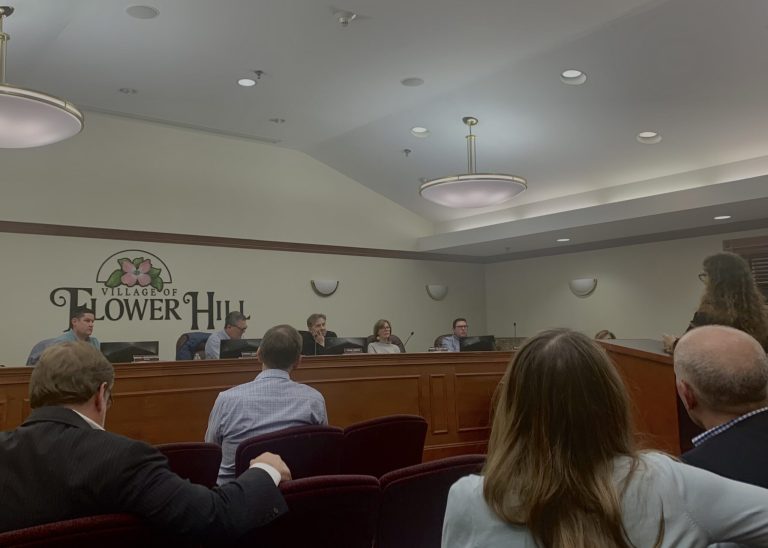
The Village of Flower Hill unanimously approved a $4 million budget with a 1.5% tax increase for 2023-2024 Monday evening, marking a 7% overall budget decrease from the current fiscal year.
Mayor Randall Rosenbaum said the tax increase is due in part to a rise in the village’s expenses for fire protection. He said the Roslyn Fire Department raised its fire budget by 6% due to a reassessment and the department opted not to engage in a five-year phase-in, which the village requested. Because of this Rosenbaum said the village is paying the increase immediately.
Flower Hill has yet to sign the contract with the Roslyn Fire Department, Rosenbaum said, as the village is seeking a resolution with the department beforehand.
Overall, the expenses paid by the village for fire protection and services from the Roslyn Fire Department are increasing by 22.41%. The village also pays for the Port Washington Fire Department services, but Rosenbaum said its budget increase was reasonable and will mean a 2.4% increase in expenses for the village.
State aid has dropped by 48% for the village, amounting to $601,822. This dollar amount contributes to 15% of the budget.
Village Treasurer Suzanne Tangredi said during the village’s budget workshop March 27 that state aid decreased because the village has received money through the American Rescue Plan Act for the past two years. These are federal grants offered in response to the COVID-19 pandemic, thus not identified as state aid.
More than half of the village’s budget expense categories are declining. This includes a 30% decrease for “staff/clerk cont.” expenses, a 35% drop in “highway” expenses and a 17% reduction in “code enforcement.”
The “staff/clerk cont.” category is decreasing because of one-time expenses for contractual services for software and scanning that the village had previously engaged in, the board explained at their budget workshop.
Highway expenses are falling due in part to half the number of seasonal employees.
Rosenbaum said code enforcement is decreasing because the village has a new code enforcer whose hours will be utilized differently than the prior code enforcer’s.
The board also voted to agree to the contract with the Port Washington Fire Department, which will institute a cost-recovery program for the first time. This means that people who utilize the department’s emergency medical services will have to pay the transportation fee and cost of medical services.
The contract includes a compassionate billing program, which automatically waives Port Washington residents’ co-payment for emergency medical services, waives fees for individuals who would experience financial hardships to pay for the services and does not automatically charge uninsured individuals.
The Fire Department changed the contract based on input from Flower Hill and Baxter Estates prior to the board’s voting on it, which Rosenbaum said makes it a better contract for all parties involved.
The change to the contract states that the Fire Department will not charge Port Washington patients their co-payment fee and that payment through insurance for services would be the responsibility of the patient. This is to ensure that the village is not responsible for any residents’ charges for using the Fire Department’s services.
The board also approved two resolutions pertaining to permits for wireless telecommunication facilities, one amending the chapter to update and strengthen the law and another to increase fees.
Rosenbaum said the intent of the amendment is to update and strengthen existing local laws regulating the siting and installations of wireless communication towers and facilities. He said this is to protect the public interests, which the resolution states as the “protection of aesthetics, open space and residential environments from redundant and unsightly antennas, structures, and other wireless equipment,” while still filling in gaps of wireless coverage in the village.
The law states that when assessing permits for wireless telecommunication facilities, the village will evaluate the aspects of the permit, including but not limited to the existing land use and developments, the character of the area, visual impacts and aesthetics, and impacts on property values.
The village is raising fees associated with the permits for varying wireless telecommunication facilities, which Rosenbaum said is done reasonably as the FCC places a cap on fees.
One-time fees would be based on the type of facility that the permit is proposing, as well as a fee for the village to consider the permit that costs $500 plus a $10,000 bond deposit toward expenses. The village also enacted an annual fee that will be decided by the board of trustees in the licensing agreement for each tower, pole or structure.
Rosenbaum said this fee increase is not punitive but rather is intended to recoup the costs of these applications. For prior applications, Rosenbaum said the village has had to hire special counsel and conduct numerous public hearings, which add to the costs.
The board will convene again at 7:30 p.m. May 1 for their next regular meeting.






